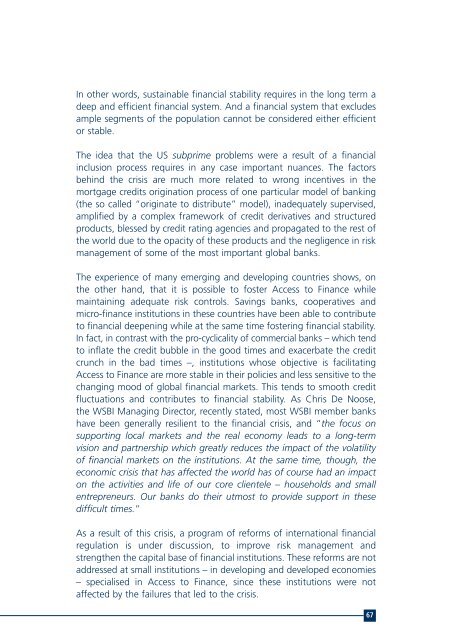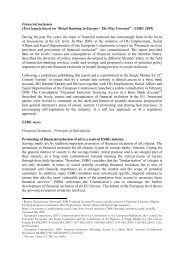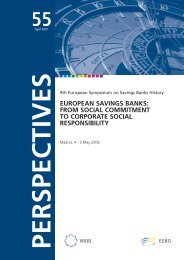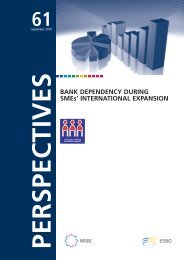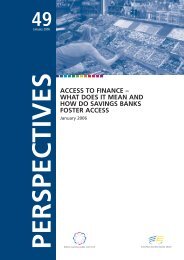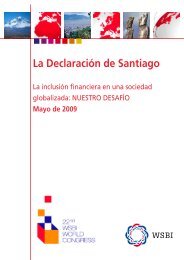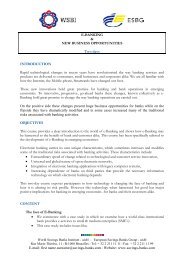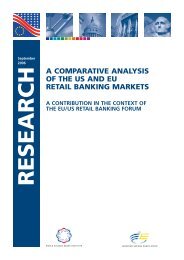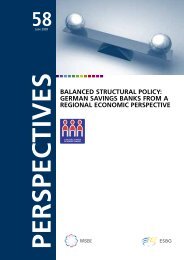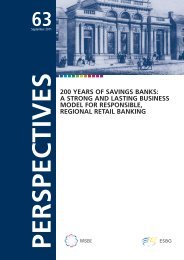Corporate Governance and Access to Finance - ESBG
Corporate Governance and Access to Finance - ESBG
Corporate Governance and Access to Finance - ESBG
You also want an ePaper? Increase the reach of your titles
YUMPU automatically turns print PDFs into web optimized ePapers that Google loves.
In other words, sustainable financial stability requires in the long term adeep <strong>and</strong> efficient financial system. And a financial system that excludesample segments of the population cannot be considered either efficien<strong>to</strong>r stable.The idea that the US subprime problems were a result of a financialinclusion process requires in any case important nuances. The fac<strong>to</strong>rsbehind the crisis are much more related <strong>to</strong> wrong incentives in themortgage credits origination process of one particular model of banking(the so called “originate <strong>to</strong> distribute” model), inadequately supervised,amplified by a complex framework of credit derivatives <strong>and</strong> structuredproducts, blessed by credit rating agencies <strong>and</strong> propagated <strong>to</strong> the rest ofthe world due <strong>to</strong> the opacity of these products <strong>and</strong> the negligence in riskmanagement of some of the most important global banks.The experience of many emerging <strong>and</strong> developing countries shows, onthe other h<strong>and</strong>, that it is possible <strong>to</strong> foster <strong>Access</strong> <strong>to</strong> <strong>Finance</strong> whilemaintaining adequate risk controls. Savings banks, cooperatives <strong>and</strong>micro-finance institutions in these countries have been able <strong>to</strong> contribute<strong>to</strong> financial deepening while at the same time fostering financial stability.In fact, in contrast with the pro-cyclicality of commercial banks – which tend<strong>to</strong> inflate the credit bubble in the good times <strong>and</strong> exacerbate the creditcrunch in the bad times –, institutions whose objective is facilitating<strong>Access</strong> <strong>to</strong> <strong>Finance</strong> are more stable in their policies <strong>and</strong> less sensitive <strong>to</strong> thechanging mood of global financial markets. This tends <strong>to</strong> smooth creditfluctuations <strong>and</strong> contributes <strong>to</strong> financial stability. As Chris De Noose,the WSBI Managing Direc<strong>to</strong>r, recently stated, most WSBI member bankshave been generally resilient <strong>to</strong> the financial crisis, <strong>and</strong> “the focus onsupporting local markets <strong>and</strong> the real economy leads <strong>to</strong> a long-termvision <strong>and</strong> partnership which greatly reduces the impact of the volatilityof financial markets on the institutions. At the same time, though, theeconomic crisis that has affected the world has of course had an impac<strong>to</strong>n the activities <strong>and</strong> life of our core clientele – households <strong>and</strong> smallentrepreneurs. Our banks do their utmost <strong>to</strong> provide support in thesedifficult times.”As a result of this crisis, a program of reforms of international financialregulation is under discussion, <strong>to</strong> improve risk management <strong>and</strong>strengthen the capital base of financial institutions. These reforms are notaddressed at small institutions – in developing <strong>and</strong> developed economies– specialised in <strong>Access</strong> <strong>to</strong> <strong>Finance</strong>, since these institutions were notaffected by the failures that led <strong>to</strong> the crisis.67


